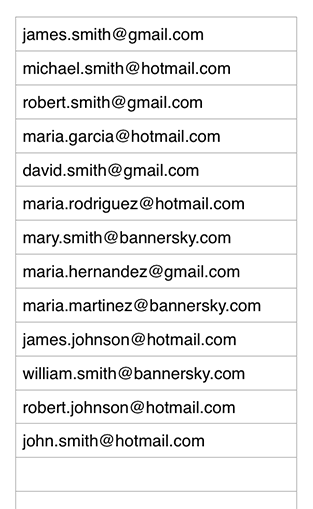Free Tips On Picking An Email List Site
Free Tips On Picking An Email List Site
Blog Article
What Should I Consider When Buying A Pathologist Mailing List?
When purchasing a pathologist email list, several key factors must be considered to ensure that the data you receive is correct and compliant with all applicable laws and appropriate for your marketing or outreach objectives. These are the most important elements to be considered: 1. Data accuracy and quality
Data source: Make sure the email list service provider collects their information from trusted sources, like professional directories, health databases or opt-in contacts that have been verified. This will ensure that the addresses on the list are accurate and up-to-date.
Verification Process: Confirm that the list of emails has been inspected recently. Providers must have a process to clean and validate emails, including invalid or unresponsive addresses. High-quality email lists result in lower bounce rates and better deliverability.
Segmentation, Customization and Filtering Select lists that allow you to filter by subspecialty and geographic area (e.g. clinical pathology, pathology for forensics), number of years of professional experience, or an affiliation with an institution. Customization allows more targeted marketing and improves your chances to connect with the right audience.
2. Legal Regulations
Data Privacy Regulations - Ensure the email list complies to the laws governing data privacy, like the General Data Protection Regulation in Europe and the California Consumer Privacy Act in the U.S.A. The pathologist data collected must be handled in a legally-sound manner that protects the privacy of individuals.
CAN-SPAM Act: If you are located in the U.S. or targeting U.S. pathologists, make sure the email list complies with the CANSPAM Act, that governs commercial emails. Non-compliance can result in hefty fines.
Opt-In Consent: Make sure that the emails on the list have been collected using the proper opt-in consent. This ensures that pathologists agree to receive promotional materials which will reduce any spam complaints.
3. Provider Reputation
Credibility of the provider Choose a reputable provider that has delivered precise and complete mailing lists. To determine the quality of service check out reviews, ask for testimonials, and connect with other health marketers.
Transparency. The company should be transparent with their methods of gathering data and how often the data is updated. Beware of companies that do not reveal the origin of their email addresses.
Customer Support: Look for an organization that provides a solid customer service in case you require assistance with the list or encounter technical problems.
4. Return on investment (ROI) and cost
Pricing Model: Take into consideration the various pricing options, regardless of regardless of whether you're paying per customer or a fixed cost for the database or even subscribing. Examine whether the price is in line with the budget for marketing and the potential return on investment (ROI).
Refund Policy. Certain providers offer a refund or guarantee if you receive a large number of inactive emails or they don't meet your expectations. Be sure that the provider has a an explicit refund or replacement policy.
Value for money - Examine the price of a list versus its quality, degree of segmentation, and other services (e.g. campaign management and CRM integration). The most affordable list might not be the most effective one if it has poor deliverability.
5. Ownership of Data, Usage of Data and Access
Licensing and Usage Rights: Make sure you know whether you are buying the list to use for one time or if you'll have the data for ongoing campaigns. Some providers offer single-use licenses some others offer unlimited use. This can be more beneficial for long-term outreach initiatives.
Exclusive vs. Shared Lists: Determine the difference between an email list that is private or shared. Exclusive lists are more efficient since contacts aren't being bombarded by multiple sources.
6. Data Integration and Format
Compatibility With CRM/Email Tools: Ensure that the email lists you have created are compatible with the email marketing or CRM tool you already use. The data must be stored in a format that is widely used such as CSV as well as Excel. This will permit seamless import.
Data Segmentation - Examine the effectiveness of filtering and separating the list after it has been integrated. Effective segmentation enables targeted email campaigns that have greater open and response rates.
7. Ethical considerations
Relevance of your message Pathologists are highly skilled professionals. Your product, message or service must be relevant to the needs of your target audience. Sending irrelevant information can damage the image of your business and can result in complaints about spam.
Spam reports are usually caused by sending unwanted emails or other content. Be sure to plan your campaigns in advance so that you keep from damaging your sender's reputation.
We also have a conclusion.
If done correctly, buying an email list of pathologists could be an effective tool in marketing. Prioritize quality of the data, legal compliance, and the reputation of the provider to maximize the potential of your outreach. Ensure that the list is tailored to your specific requirements and that you adhere to data privacy regulations and ethical practices in marketing. If you take these points into consideration, you can achieve effective and successful email campaigns targeted at pathologists. Check out the best pathologist email list for website guide.
What Should I Consider Before Purchasing An Urgent Care Email List?
It's crucial to think about a number of aspects when buying an email list to provide urgent care. This will help ensure that the list you purchase is accurate, compliant with law, and relevant to marketing goals. Take note of these important elements: Quality of data and accuracy
Data source: Ensure that the service provider has sourced their data from reliable sources such as healthcare databases or medical associations. Avoid lists generated by scraping data or unreliable means as they could contain incorrect and outdated information.
Verification Process: Confirm the list of email addresses is continuously verified and updated. A trustworthy supplier will use a rigorous verification process to eliminate outdated or invalid email addresses. This improves deliverability and decreases bounce rates.
Segmentation of Lists: The list could be classified according to the following elements: location (city/state/region) and size (e.g. urgent care facilities aren't huge) as well as the types of services offered (e.g. diagnostics and pediatrics), as well as roles that decision-makers play. The lists that are targeted will increase your outreach and increase engagement.
2. Legal Regulations
Data Privacy Laws: Ensure the compliance of local and national regulations, such as the California Consumer Privacy Act, which is applicable to the U.S.A. As well as applicable European data protection laws. This means that email addresses must be gathered with consent and handled in accordance with lawful processes.
Conformity to the CAN-SPAM Act: In the U.S., your email marketing campaigns need to comply with the CAN-SPAM Act. Incorporate the physical address of your company, stay clear of false subject lines, and offer an easy opt-out mechanism. Infractions to the law could result in penalties or damage to your business's reputation.
Opt-in Consent: Check that all email addresses on the list were acquired with consent. This means that the recipients have signed up to receive marketing messages. This will minimize the risk for spam complaints, and any legal concerns.
3. Provider Reputation
Establish Provider: Choose one that has an established track record of providing quality, compliant email lists. You can determine a company's reliability by reviewing reviews, testimonials, and cases studies.
Transparency - The provider must be clear about the data's source and the date when it was last changed. If the data provider isn't able to provide you clear answers, then it may indicate poor-quality data.
Customer Support: A strong customer support team is crucial if you require assistance in tackling technical issues as well as list customization or conformity. A company that is responsive can to assist you in getting the best value from your list.
4. Cost and return on investment (ROI).
Pricing Models: Email list providers typically offer different pricing models such as pay-per-contact and flat fees. You should consider the pricing structure based on your marketing budget and the expected return. You should balance the price of the list against the validity and accuracy of the data.
Refund Policy or Replacement Policy. Reputable providers provide refunds or replacement policies if the majority of emails are invalid or non-deliverable. Make sure to clarify the policy's terms before you purchase.
Value for money: Do not choose the cheapest choice. Instead, look for lists that are precise and feature precise segmentation. Investing in high-quality lists will increase engagement and improve the return on investment.
5. Data Ownership and Usage
Multiple-Use or Single-Use? Find out if you can use this list once for a campaign, or many times. Lists that can be used for multiple purposes offer greater value, particularly when you intend to conduct continuous outreach campaigns.
Exclusive vs. Shared Lists: Determine whether the list is exclusive to your business or shared with buyers. Lists shared with others can cause lists fatigue because recipients might receive numerous marketing messages. Engagement rates are likely to decrease.
6. Data Integration and Format
CRM Compatibility: Ensure that your email list has been delivered to you in a format compatible to, such as CSV (Comma Separated Values) or Excel. This will facilitate the seamless integration of your campaigns.
User-friendly: Email lists should be simple to manage and segment according to specific requirements. An organized email list makes targeting and personalization easier.
7. Ethical Aspects
Relevance of the content: Urgent care professionals are usually working, and it's essential to provide them with pertinent and useful information. Create your own messages that meet their particular needs, such as the medical equipment, medical supplies or healthcare technology they need. Unrelated content could damage your brand reputation and decrease engagement.
Reduce the frequency of your email. Spam complaints can be brought on by sending too many emails or messages that aren't specifically requested.
Conclusion
When you purchase an urgent care list of emails, concentrate on data accuracy as well as legal compliance. the reputation of the provider. Be sure that the list is segmented and updated regularly and in compliance with privacy laws. By sending targeted information and investing in an effective, high-quality mailing list, you will increase the number of people who respond and reap a great return on your investment. See the top urgent care email list for website advice.